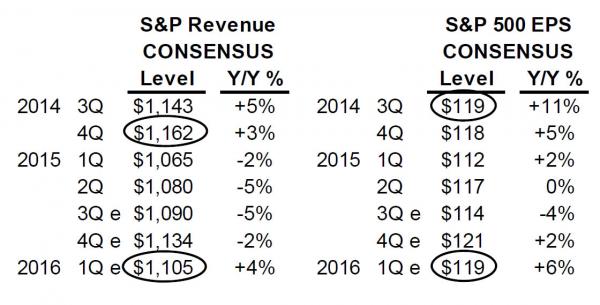Earlier this week we said that with the third quarter just days away from the history books, Wall Street is preparing for the worst earnings season since 2009, with Factset further noting that “if the index reports a decline in earnings for Q3, it will mark the first back-to-back quarters of earnings declines since 2009.”
We presented the following table from ISI which showed that not only is the US now officially in a revenue recession, with every single quarter in 2015 set to post a decline from the previous year, with even the overly optimistic consensus case of a 4% increase in Q1 2016 revenues unable to regain sales last seen in Q3 2014, but S&P500 expected earnings in Q1 2016 of 119, a 6% increase from the previous year, will barely put the market back to levels seen in Q3 2014.Â

But before we get there we have to get through Q3: a quarter when not only revenues are set to tumble another 5%, but this time not even hundreds of billions in buybacks will prevent the EPS from sliding, and according to Factset, Q3 EPS are set to tumble 4.5%.
In other words, while the revenue recession continues, the S&P 500 (SPY) is about to enter its first earnings recession in six years.
Earlier today the mainstream media caught up noting that “Wall Street is bracing for a grim earnings season, with little improvement expected anytime soon” and added some facts of its own: expectations for future quarters are falling as well. A rolling 12-month forward earnings per share forecast now stands near negative 2 percent, the lowest since late 2009, when it was down 10.1 percent, according to Thomson Reuters I/B/E/S data.

“The 3.9 percent estimated decline in third-quarter profits – down sharply from a July 1 forecast for a 0.4 percent dip – would be the first quarterly profit decline for the S&P 500 since the third quarter of 2009.”
“Earnings recessions aren’t good things. I don’t care what the state of the economy is or anything else,” said Michael Mullaney, chief investment officer at Fiduciary Trust Co in Boston. Michael is clearly paid the “big bucks” for a reason.

